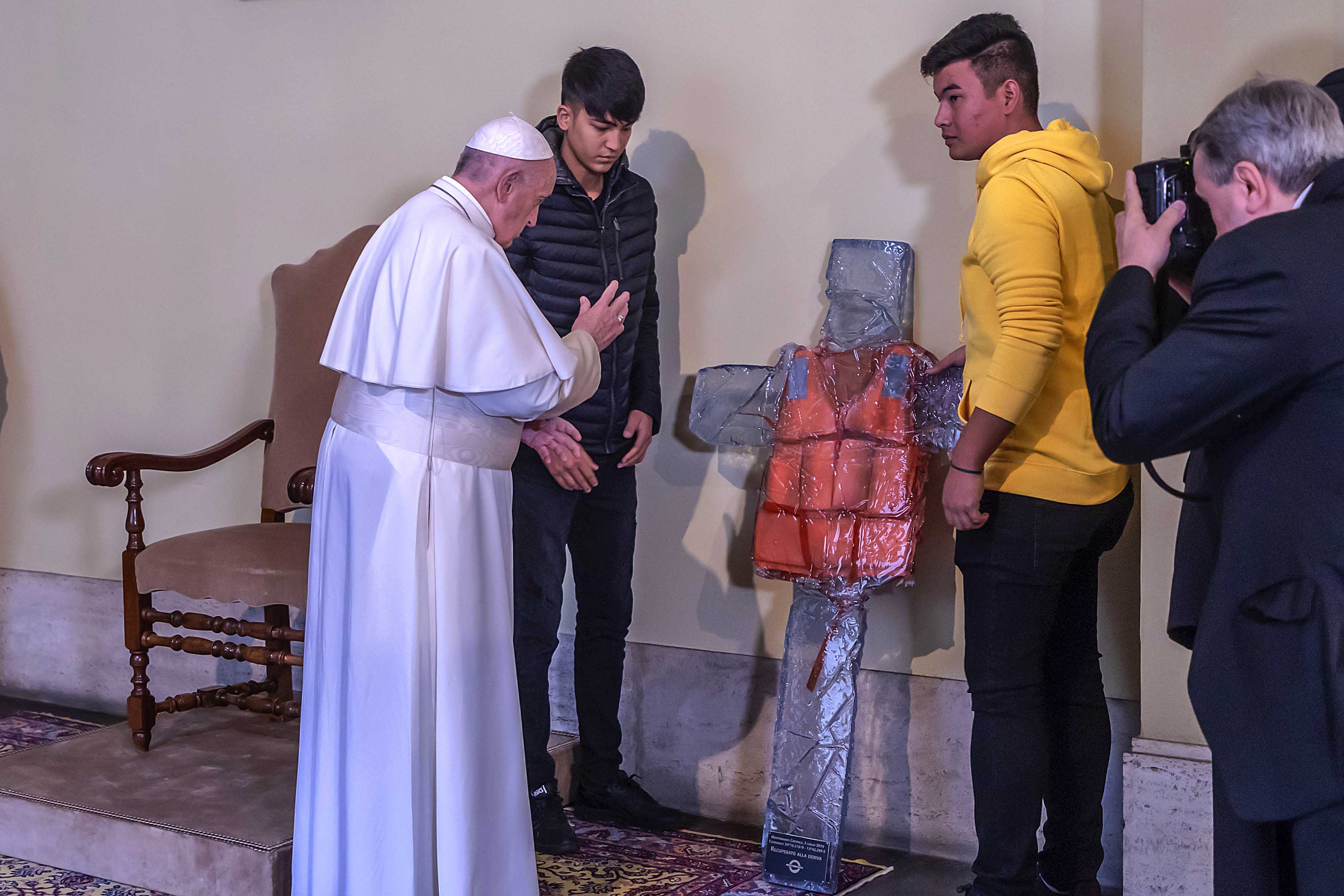REFUGEES
Pope Francis met a group of migrants and refugees who recently arrived from the Greek island of Lesbos with humanitarian corridors and made yet another appeal to receive those who are forced to flee their lands in the hope of a better future. “Our sloth is sinful”, “it is not by blocking their vessels that the problem is solved”. ” Empty the detention camps in Libya.” As of today, a Cross “clothed in a life jacket” is hanging from the Belvedere Courtyard

“Our sloth is sinful.” From the Vatican’s Belvedere Courtyard, where a resin cross “clothed” with a life jacket belonging to one of the many unknown migrants who lost their lives at sea was unveiled, the Pope sent out yet another appeal to embrace and take care of the multitudes forced to leave their lands due to our injustice. “It is injustice that forced many migrants to leave their lands, and to suffer abuse and torture in detention camps”, Francis said during a meeting with a group of refugees who had recently arrived from Lesbos with humanitarian corridors.
“It is not by blocking migrant vessels that the problem is solved”,
the Pope said: “Serious efforts must be made to empty the detention camps in Libya, examining and enacting all possible solutions. Traffickers who exploit and mistreat migrants must be denounced and prosecuted, without fear of disclosing connivance and complicity to authorities. Economic interests must be put aside in order to focus on the person, each person, whose life and dignity are precious in the eyes of God. We must help and save, as we are all responsible for the life of our fellow other, and the Lord will ask us to account for this at the time of judgment.”
“It is injustice that rejects them and causes them to die at sea”,
Francis reaffirmed, echoing his first apostolic visit to Lampedusa. “The life jacket ‘clothes’ a cross in coloured resin, expressing the spiritual experience I read in the words of the rescuers”, the Pope said: “This is the second life jacket that I received as a gift. The first was given to me a few years ago by a group of rescuers. It belonged to a little girl who drowned in the Mediterranean. I then donated it to the two Under-Secretaries of the Migrants and Refugees Section of the Dicastery for Promoting Integral Human Development. I told them, ‘This is your mission!'”. “With those words I wished to convey the Church’s fundamental commitment to save the lives of migrants, thereby welcoming, protecting, promoting and integrating them”, Francis pointed out, explaining that “this second life jacket, given by another group of rescuers only a few days ago, belonged to a migrant who was missing at sea last July. No one knows who he was or where he came from. We only know that his life jacket was found adrift in the Central Mediterranean Sea, on July 3, 2019, at specific geographical coordinates.”
“I have decided to display this life-jacket here, ‘crucified’ on this cross, as a reminder that we must keep our eyes open, keep our hearts open, to remind everyone of the urgent commitment to save every human life, a moral duty that unites believers and non-believers alike.”
Those were the words chosen by the Pope to explain why he chose to place a cross in the Belvedere Courtyard in memory of migrants and refugees, ‘dressed’ in a life jacket. “In the Christian tradition the cross is a symbol of suffering and sacrifice and of redemption and salvation at the same time,” Francis said: “This cross is transparent: it challenges us to be more attentive and to always look for the truth. The cross is luminescent because its purpose is to bolster our faith in the Resurrection, Christ’s victory over death”. “Even the anonymous migrant, who died in the hope of a new life, partakes in this victory,” the Pope reassured: “The rescuers told me about how they are learning humanity from the people they succeed in saving. They have told me that in every mission they rediscover the beauty of being one great human family, united in universal brotherhood.”
“How can we fail to listen to the desperate cries of so many brothers and sisters who would rather face a stormy sea than slowly die in Libyan detention camps, places of torture and disgraceful slavery?”
It was the first of a set of challenging questions with which the Pope concluded his speech: “How can we remain indifferent to the abuses and violence inflicted on innocent victims, leaving them at the mercy of ruthless traffickers? How can we ‘pass beyond’, like the priest and the Levite of the parable of the Good Samaritan, thus making ourselves responsible for their death?”. Finally, the Pope thanked “all those who have decided not to remain indifferent and are doing everything in their power to help the unfortunate, without asking too many questions about how or why the unfortunate one ended up along their way.”